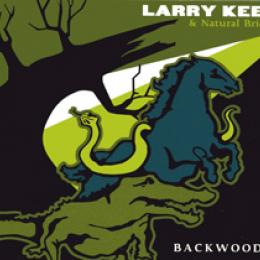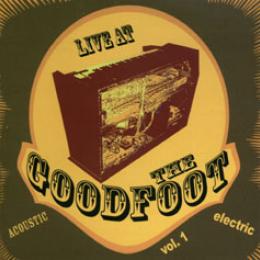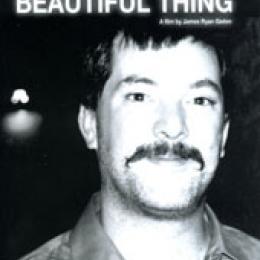By Paul Kerr
HGMN: You just did the Big Bass and Bluegrass fishing festival. How did that go?
LK: It was great. It's down in the middle of Georgia. It's a pristine private lake down there so it creates sort of a festival atmosphere which is nice. It combines a lot of fishing of course, cause it's such good fishing, but it also combines music workshops every day. So we do a workshop each day that's two and a half, three hours long, sort of an official workshop where we're all seated around a circle with the students. It's basically a way to learn how to play music with other people, which is so handy to learn.
HGMN: Because everyone plays in their living room but they're intimidated.
LK: Yeah, and this does give them the confidence. At a certain point it's coming around the circle to you. "Ok, do you wanna do this? What do you wanna play?" It gives the students a chance to play music that other people bring to the table that they wouldn't know, so it's a real learning experience. And the rest of the time it's just great. We have fish fries from the fish we catch. There's always something great to eat there. The catering is just fantastic country food. And then we play music practically all night long, so it's a good deal. We're gonna get ready for 2010 and do some more of them too.
HGMN: I was reading an article online from 1880 about the philosophy of fishing, and it reminded me of music in a way. It said fishing is the pursuit of the unknown and unseen.
LK: "The unknown and unseen." Man, that is so real. That's the way it is to me - that connection. Because in playing music we definitely improvise like crazy all over the place and that leads into the unknown for sure. And fishing for sure is like that. Every cast, you never know, you might get the world record.
HGMN: You might find your boots.
LK: Absolutely. For me, I get off the road, fishing is one of the greatest ways to clear your head out after playing so many notes and just having your head occupied by stuff all the time. I can go fishing and that's all I think about is fishing.
HGMN: Do you play music in the boat?
LK: Oh yeah, we'll bring a guitar, a fiddle. My buddy's a great fiddler. We've got a good boat banjo too. Get out there and when the fishing gets slow or when you just need some inspiration, whip 'em out and pick one, you know? Plus it's awesome on the water to do that.
HGMN: You must get some great pictures.
LK: Yeah, we've got some good video. I've got a website I'm launching. It's called Fishin' and Pickin', and it's all fishing musicians from all over the place. I've got some Alaska footage, some footage from Belize, Idaho, Montana, Hatteras, just all kinds, from fishing musicians sending me pictures and videos of what they do. Then on the music side, the pickin' side, the website will have tablature and music links and all of our new music that we're releasing will be on there as well. So that's where you'll go to get our new music - to Larry Keel's Fishin' and Pickin' website. It's a cool, cool thing. We've got some promise of a cable show to do about it. So we're putting together a lot of plans. 2010 should be really good. Trying to stay out there, get the word out and do something new too.
HGMN: You've got to be active to keep your fanbase thinking about your act.
LK: Definitely. I do a lot of different things too, try to touch a lot of different crowds with my music. I'll be doing some shows with Adam Aijala from Yonder Mountain out in the Pacific Northwest in December. They've got a big thing going on out there. Adam's always been just a great friend and a colleague as well, as far as trading licks with him and everything. He's a great player. It's good for us to get together and be able to do something different. Getting to play with Tony Rice tonight, it's always an honor and just ultra-special, every time, every note really. He's always been my hero, so it's like a dream come true really.
HGMN: How did you meet him?
LK: I met him a few years ago at different times. I was an aspiring young guitar player and different friends of his would introduce me to him. I don't think he remembered me, he probably meets a million people like that, but I remember it (laughing). But then we did a few tours together where we'd do three or four shows in a row and then the next weekend we'd do three or four shows. Started getting to know each other a lot like that. And playing with Vassar Clements in the band as well at the same time, so it was Tony and Vassar just really mixing it up.
HGMN: You grew up with that music all around you, but to find yourself with the people from those records next to you...
LK: Oh yeah, there's that sound, right here in my ear, right beside me. Going to the point about keeping your fanbase interested and excited about what you do - I think a lot of that works for us, getting Tony to play with us and doing the shows with Adam and we've got some things we're getting ready to do with Keller Williams too. So that's a great, different crowd for us to touch with our stuff. Jenny [Keel, Larry's wife and bassist] and I are going to be part of Acoustic Syndicate basically in December for a couple of shows, cause they needed a bass player and I know all their material so it's just like falling off a log for me. I love it. What other band do I get to do that with, you know? So that's what we try to do, just keep the audience guessing. It's so much fun for us too. You've got to do everything you can these days to get the word out there, and you're still not sure if they're going to come out.
HGMN: I came up with a great idea. Maybe you've heard of this, but I don't see why you can't build a fishing rod into a guitar. So you can be playing and then you feel the bite - "Do I go for the fish? I'm playing this great solo, but..."
LK: Oh my goodness. Oh my goodness. (laughing) I tell ya, that would be excellent. I've played parties or weddings where the lake's right behind me and I was like, man if I could just set my fishing pole right here on the stage. If I had it attached to my guitar - I've thought about that. Yeah, tie on some fishing line or something.
HGMN: I was reading about the history of the Blue Ridge Mountain area. You grew up in that traditional atmosphere. Did you have moonshiners in your family?
LK: Yup, I got an uncle that messes around with it. But my granddaddy, he made the finest there was down in his stretch of the woods down in Dickinson County. Even during Prohibition, the government bought his liquor cause his was proofed so high. I guess they were buying it for themselves pretty much. They had a contract basically to buy twenty gallons at a time, and that fed his family. It really did at that point cause he worked in the mines, but still he had a big family. Like today, basically you got to do anything you can to make it roll - people working hard. Yeah, he was good at what he did and I'm thankful for it. And I guess I've got it in my veins cause I've loved it all my life, and it just seems to come and find me. It's a good problem and a bad problem. (laughing)
HGMN: Depends what time of day it is.
LK: Oh yeah, it definitely does. Definitely.
HGMN: The traditional music fans you grew up with - do they like new, progressive bluegrass?
LK: Bluegrass is a strange sort of deal because bluegrass by its own standards is probably made up of a lot of extreme purists, which is all great and that's what keeps classical music known and jazz music and blues and bluegrass and everything. But the way I see it, you like what you like, but at the same time the music has to grow at some point. I'm not into everybody sounding exactly the same to sell a million records. "Because this band sounded like that, if we try to sound like that and look like that maybe we'll sell a million records." And that's the way the music industry works. I was told by a very reputed national person, "Come on up into the fifty-story record company and they'll buy you a good pair of boots and a pair of tight jeans and get you a haircut and could make anybody a star."
But bluegrass isn't meant to be that way. Yeah, it's been made into a business and it's growing as an industry, but the music should speak for itself. And there are bands out there that are, like Steep Canyon Rangers, just true sounding bands that are not trying to sound like anybody else, like Del McCoury Band. I won't mention the names that aren't doing it, but I'm sure anyone that follows the subject would know what I'm talking about.
I'm like that. I've always loved bluegrass, and I try to play my bluegrass pure and with respect to the writers, but I've got a lot of music in me. I love reggae, I love jazz, I love rock and roll, I love blues. I got to let it out too. And it might come out in a bluegrass flavor but you can tell there's something weird going on there. That's what I say - you've got to sort of let it all breathe and grow. Everything's got to grow or it's gonna die, you know? That's the way I look at it. Cause a lot of the old fellows from bluegrass who wrote all this and played that are passing on, and I hate that. But who's gonna take it on from there? There's got to be a new generation. I want it to be respectful but yet grow. Bluegrass for the year 2010. Pretty wild concept.
HGMN: In jazz and bluegrass, the best players get together a lot - it's not about bands so much. In rock, if two guitarists get together it's instantly legendary because it hardly ever happens, but the Traveling Wilburys happens every day in the bluegrass world.
LK: That's the way it is. People that hear bluegrass remember it from either hearing it around a fireside or in somebody's living room, and it was always that same sort of thing. "Oh, so and so over here is a great player, you guys really need to meet him." A lot of that. And it's a small world too, in bluegrass. You're bound to meet each other at some point. It's just hospitable, too. "Come on, let's play some music together. Let's hear what you've got." I've been to so many crazy places that you would never figure there's anybody that ever listens to bluegrass, and all of a sudden here comes someone out of the woodwork - "I play a banjo!" "Oh really? Let's play a tune." It's good to see how its been passed around and grown.
HGMN: If Bela Fleck can come from Brooklyn, they must be everywhere.
LK: Absolutely. There's a guy that's pushed it all the way to the edge of how far you can take it. It's just cause he's heard so many things, being in that city, that's what he's been influenced by. You might not call it bluegrass, but it comes from there. Amazing, amazing.
HGMN: You did a stint at Tokyo Disneyland when you were young.
LK: In Tokyo there were some great musicians. Big jazz scene there, man. Really cool. Really good jazz players. I'd go out to these bars and listen to the jazz musicians, students of Oscar Peterson and older cats that played with Mingus. It was just great. But over there it was interesting to see how bluegrass had spread, because obviously after World War II there were banjos and guitars and mandolins and fiddles that had been left or traded and became popular with a lot of the Japanese musicians. There are some Japanese bluegrass musicians that are absolutely amazing. A lot of them have been involved in bluegrass I guess since the '40s. Great bands. Bluegrass 45 was one of them. Just fabulous stuff. They're really working it. But yeah, we did this with Tokyo Disneyland. It's a great gig to have at 18 years old. We did six half hour shows a day, which was a half hour on, half hour off. It really worked great. It was just fascinating to them basically that we would play in cowboy hats and flannel shirts and cowboy boots.
HGMN: And did anyone ever really wear that?
LK: Oh, hell no, not really. I mean, cowboys wear it, you know? I ain't a cowboy and I don't know any cowboys that play bluegrass. They play Western swing. But that's what their impression of it all was. It was great. Great way to get your chops up. They'd let us basically play what we wanted to as long as we played a "Red River Valley" every now and then or "Foggy Mountain Breakdown," something familiar. "Rocky Top" of course, that was popular. It was great. At 18 years old I was a hillbilly. I'd never really been out of Virginia. I went to Florida to audition with my buddy and then we went straight to Tokyo and just, "Wow, this is pretty crazy." But we got a lot of respect. It was a great country, really. The way it was run was the cleanest country I've ever seen and just efficient. It's just amazing. A really good time if you ever get a chance to go, that's for sure. Safe as it gets.
HGMN: If you had to pick one, what's the best concert that you ever saw?
LK: For just the general life-changing thing I would say The Grateful Dead in Cincinnati. That's the only time I ever saw them. I saw the Jerry band, which was life-changing too, like four shows in a row. But I got to see the Dead once in Cincinnati. I think it was '89, pretty sure about that. You never forget it, you know what I mean? You hear all you want but till you go see the whole thing and experience it all...
HGMN: And that's the only time you got to see them?
LK: That's the only time I got to. I had a million chances but at the same time I was going out and seeing Tony Rice who was life-changing for me, a great guitar player. He's a statue of the way it should be. So I spent my time going and seeing him. I was a heavy metal freak too. I used to like Judas Priest and stuff like that. Took a lot of that in. Took in a lot of foreign concerts - Irish and just all kinds of things, Italian music, just anything I could get a hold of, really. But yeah, that Dead show was pretty much a change of the way you look at things, all the way around - musically, everything. It was beautiful.





